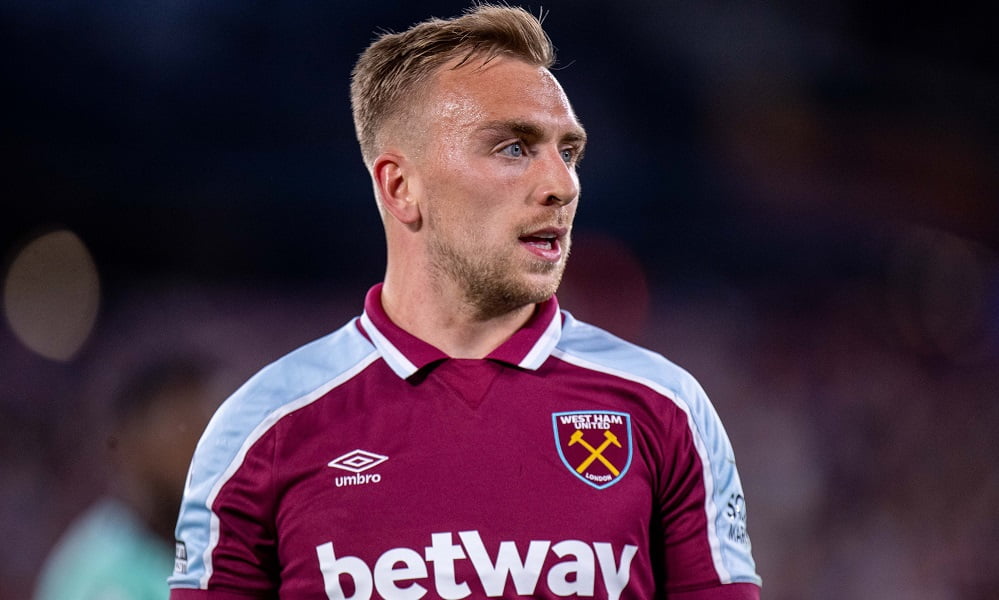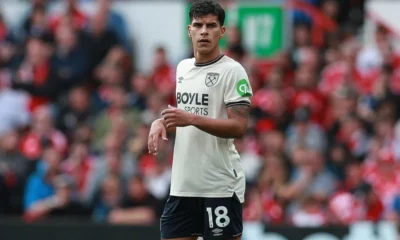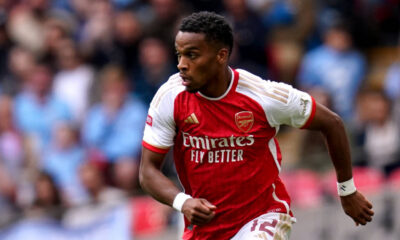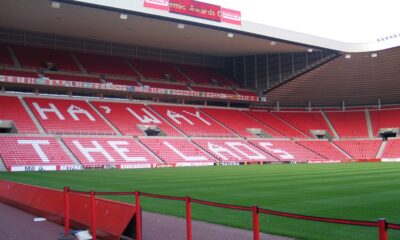Features
Who are the largest sponsors in the Premier League?
The Premier League’s popularity and financial success are in large part due to its strong partnerships with sponsors from the betting industry.
The Premier League is the top-flight football league in England, consisting of 20 clubs that compete against each other every season. It is one of the most popular and lucrative leagues in the world, attracting millions of viewers and generating billions of pounds in revenue each year. The league’s popularity and financial success are in large part due to its strong partnerships with sponsors.
Sponsorship plays a vital role in the Premier League, as it provides clubs with the financial resources they need to compete at the highest level. Sponsorship deals can range from kit manufacturers to betting companies, technology firms, and even automobile manufacturers. These partnerships provide a significant source of revenue for clubs, which can be used to improve their facilities, acquire new players, and invest in youth academies.
In recent years, the Premier League has attracted some of the world’s biggest brands as sponsors. The league’s global reach and popularity have made it an attractive platform for companies looking to increase their brand awareness and reach a wider audience. As such, the league has seen a steady increase in sponsorship investment, with deals worth millions of pounds being signed every year.
Overall, the Premier League’s success is largely due to its strong partnerships with sponsors. These partnerships have not only provided clubs with the financial resources they need to succeed but have also contributed to the growth and global popularity of the league itself.
Largest Sponsors in the Premier League
The Premier League has a wide range of sponsors, from sports apparel brands to technology companies, automobile manufacturers, and betting companies. The top sponsors in the Premier League are some of the world’s most recognizable brands, and their investments help to fund the league and individual clubs.
The largest sponsor in the Premier League is Nike, which supplies kit for four teams, including Chelsea, Tottenham Hotspur, Liverpool, and Brighton & Hove Albion. Nike’s investment in the Premier League extends beyond just kit sponsorship, as the company also provides financial support for grassroots football in England.
Another significant sponsor in the Premier League is Adidas, which supplies kit for four teams, including Manchester United, Arsenal, Leicester City, and Wolverhampton Wanderers. Adidas has been a long-term partner of the Premier League and has also been involved in grassroots football initiatives in the UK.
Sports Direct, the UK’s leading sports retailer, is also a significant sponsor of the Premier League. The company has a partnership with Newcastle United, which includes kit sponsorship and stadium naming rights.
In terms of technology companies, the largest sponsor in the Premier League is EA Sports, which produces the popular FIFA video game series. The company has a long-standing partnership with the Premier League, and its logo is visible on advertising boards during matches.
Another significant sponsor in the Premier League is betting company Betway, which has partnerships with West Ham United, Brighton & Hove Albion, and Crystal Palace. While there has been some controversy around the role of betting companies in football, they remain a major source of sponsorship revenue for Premier League clubs.
In terms of ranking the largest sponsors based on investment, it can be difficult to compare as each deal can vary in terms of duration and value. However, according to data from sports marketing company Two Circles, Nike is the largest sponsor in the Premier League in terms of investment, followed by EA Sports and Adidas. Other significant sponsors include Chevrolet, Standard Chartered, and Emirates.
Betting Companies
Betting companies have played an increasingly significant role in the Premier League over the years, with many teams now having sponsorship deals with bookmakers. These partnerships can provide clubs with a significant source of revenue, which can be used to invest in new players or improve facilities.
However, the involvement of betting companies in football has also been controversial, with concerns over problem gambling and the influence of gambling companies on the sport. Some critics argue that the close relationship between betting companies and football can contribute to gambling addiction, particularly among young fans. There have also been concerns about the impact of betting-related advertising on vulnerable groups, such as those with gambling addictions. Despite these concerns, many Premier League clubs continue to have sponsorship deals with betting companies.
For example, Betway sponsors West Ham United, Brighton & Hove Albion, and Crystal Palace, while Sportsbet.io is the principal partner of Southampton FC. Other bookmakers involved in the league include Bet365 and 1xBet. It’s worth noting that not all betting companies are created equal, and there are many different types of sites that cater to different types of gamblers. Some offer casino games such as slots and table games in addition to sports betting, while others specialize in specific sports or markets. It’s important for individuals to research and choose a reputable site that suits their needs and gambling preferences.
In conclusion, while betting companies have become an important source of revenue for Premier League clubs, there are also legitimate concerns about their involvement in the sport. It’s important for the league and its clubs to ensure that they are promoting responsible gambling practices and taking steps to minimize the potential harm caused by gambling addiction.
Sportswear Brands
Sportswear brands have been a significant part of the Premier League’s commercial landscape for many years. Kit sponsorships provide an important source of revenue for Premier League clubs, helping them to finance new signings, improve facilities and invest in youth development.
The impact of sportswear sponsorships on Premier League clubs can be significant. Clubs with high-profile kit sponsorships are often seen as more successful and prestigious, and this can help them to attract new fans and sponsors. Additionally, clubs with large kit sponsorship deals can use the revenue to invest in new players, providing them with a competitive advantage on the pitch.
Some of the world’s largest sportswear brands are involved in the Premier League. Nike and Adidas, two of the biggest names in the sportswear industry, both have multiple kit sponsorship deals in the league. Other brands involved in the league include Puma, New Balance, and Under Armour.
The impact of these sponsorships can be seen in the design of clubs’ kits, which often incorporate brand logos and colors. Additionally, kit launches are often highly anticipated events, with clubs going to great lengths to unveil their new designs.
Examples of Premier League clubs with notable sportswear sponsorships include Manchester United, who have a long-standing partnership with Adidas, and Liverpool, who are sponsored by Nike. Chelsea, Tottenham Hotspur, and Leicester City are also sponsored by Nike, while Arsenal’s kit is supplied by Adidas.
In conclusion, sportswear brands play an important role in the Premier League, both in terms of financing clubs and promoting their brands. While some may argue that the prominence of these brands in the sport is a negative influence, it’s clear that the revenue generated by these sponsorships has been crucial in helping clubs to achieve success both on and off the pitch.
Technology Companies
Technology companies have become increasingly involved in the Premier League in recent years, with many clubs now partnering with firms in the tech industry. These sponsorships can provide clubs with access to new technologies and services, as well as a source of revenue to invest in new players and facilities.
The impact of technology sponsorships on Premier League clubs can be significant. By partnering with companies in the tech industry, clubs can gain access to cutting-edge technologies that can help them to gain a competitive advantage on the pitch. Additionally, these sponsorships can help to enhance the matchday experience for fans, with the use of technologies such as virtual and augmented reality.
Some of the world’s largest technology companies are involved in the Premier League. For example, Microsoft is the official technology partner of the league, providing its cloud services and other technologies to enhance the league’s digital offerings. Other technology companies involved in the league include EA Sports, which supplies the official video game of the Premier League, and Intel, which has partnered with Tottenham Hotspur to develop a state-of-the-art stadium with advanced connectivity and fan experiences.
Examples of Premier League clubs with notable technology sponsorships include Manchester City, who have partnered with Cisco to develop a new Wi-Fi network at the Etihad Stadium, and Arsenal, who have a partnership with Intel to develop a new matchday experience for fans.
In conclusion, technology companies are playing an increasingly important role in the Premier League, both in terms of providing clubs with new technologies and services, and in terms of generating revenue for the league and its teams. While some may argue that the prominence of technology companies in football is a negative influence, it’s clear that the benefits of these partnerships can be significant, both for clubs and for fans.
Conclusion
In conclusion, the commercial landscape of the Premier League is shaped by a range of sponsors, including betting companies, sportswear brands, and technology firms. These sponsors provide vital revenue for clubs, helping them to finance new signings, improve facilities, and invest in youth development.
While the role of sponsors in football has often been a controversial topic, it’s clear that these partnerships can have significant benefits for clubs and fans alike. By partnering with betting companies, clubs can access new revenue streams, while sportswear and technology sponsorships can provide clubs with access to cutting-edge technologies and enhance the matchday experience for fans.
However, it’s also important to acknowledge the potential negative effects of these sponsorships. Betting companies, in particular, have come under scrutiny for their role in promoting gambling to football fans, and it’s important for the league and its clubs to ensure that responsible gambling practices are in place.
Overall, the Premier League’s sponsorship landscape is constantly evolving, with new partners and technologies emerging all the time. It’s clear that sponsors will continue to play an important role in the league’s future, and that their impact will be felt both on and off the pitch.






















